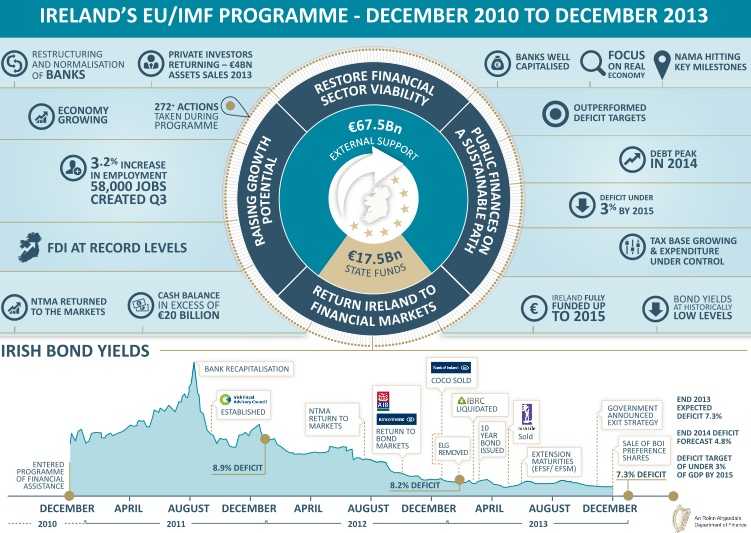Ireland has officially left its bailout behind three years after the country appealed to international lenders to help it avert a financial collapse.
Since receiving help from the IMF (International Monetary Fund) and the European Union, Ireland has raised taxes and reduced spending. With the minimum of public unrest, the country has met every major target under the €85 billion ($112 billion) program.
In an official statement, Ireland’s Department of Finance announced:
Following a careful and thorough assessment of all of the available options, and following a broad consultation process, the Irish Government has today (14th November 2013) decided that Ireland will exit the EU/IMF programme in December as planned and without a pre-arranged precautionary credit facility.”
The Finance Department added that the Irish Government feels the best option for the country at the moment is to exit the program, as had been originally planned, in December 2013.
Ireland has the money to meet maturing commitments
Ireland now has more than €20 billion in cash reserves, nearly twice as much as its lenders had expected, which ensure the country can meet its maturing commitments and funding costs until early 2015. Irish sovereign bond yields are lower than at any time in history.
The Irish government says its finances are under control and “comfortably in line with EDP (Excessive Deficit Procedure) targets.” It is aiming for a 4.8% deficit in 2014, well below the EDP target of 5.1% and “will deliver a primary balance or small surplus.” The aim is to reduce the deficit to below 3% in 2015.
Finance Minister, Michael Noonan, said in a news conference today:
“This isn’t the end of the road. This is a very significant milestone on the road. But we must continue with the same types of policies.”
“The real heroes and heroines of the story are Irish people, who’ve had their taxes increased, they’ve had their services cut drastically – some of them, particularly public servants, have had very serious pay cuts ”
Noonan received an award from the German-Irish Chamber of Commerce in a sign of admiration for the country’s efforts.
Unequal economic prospects within Ireland
Economic prospects in Irish cities are very different from those in rural areas and small towns. While urban areas are seeing new jobs and rising property prices, in small towns and the countryside empty shops, buildings and homes remain abundant, and unemployment is still high.
Noonan says he will consider reducing income tax to boost the economy, which is forecast to grow by 2% in 2014.
IMF Managing Director, Christine Lagarde, said:
“The Irish authorities have established a very strong record of policy implementation. This bodes well as Ireland exits its EU-IMF-supported programe.”
Public expenditure minister Brendan Howlin admitted that on occasion he had wondered whether his country would make it out of the bailout.
Howlin said:
“There were many who believed that we would never reach today, and in truth, there have been times along the journey we had doubts ourselves.”
“Some of the challenges became even greater because of the external challenges that came in the Eurozone area over the last number of years.”


